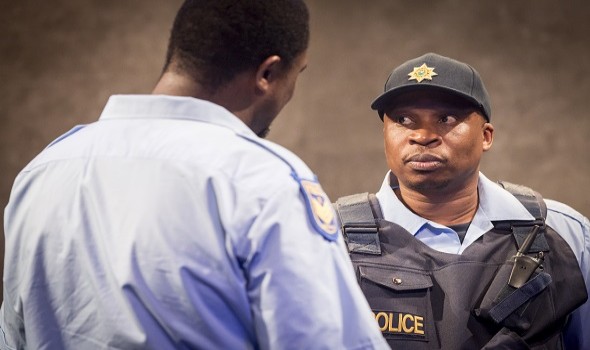a review of I See You
a review of I See You

I See You will resonate with all children of migrants who visit their parents’ original homeland without speaking that country’s language – even if they don’t get arrested.
So many British children of Indian, Pakistani or Bangladeshi parents have felt the confusion and sometimes annoyance they cause when their hosts address them in Hindi, Urdu or Bangla and they don’t understand: “Sorry, I speak English.”
Assumptions of class and wealth and identity immediately shoot to the surface, usually buttressed by prejudice and stereotyping.
In I See You at London’s Royal Court Theatre the impact is magnified – more like a small explosion than a conversation – because this is nighttime in post-apartheid South Africa, and the protagonists are a young hopeful student and a frustrated freedom fighter-turned policeman. Both are black but race is added to the volatile mix by proxy when officer Buthelezi observes, “only one of us is black”.
The piece is a short, intense thriller, sharply written and superbly acted. It’s gripping and entertaining, but like all good theatre it makes you think. I wonder if writer Mongiwekhaya would be surprised at what individual members of the audience take away with them.
In this case, you cannot help but wonder about how to deal with the frustration of those who fought for freedom in the anti-apartheid struggle (or in Zimbabwe, or against dictatorship in, say, Uganda) but now feel neglected and a sense of injustice that others have reaped the benefits. Actor Desmond Dube has described it as "a silent war - when the country was given back they [the liberation fighters] were just pushed aside, to say, You don't really matter, the educated matter."
But for me, the issue that hit home hardest was how personal aggravation – in this case, Buthelezi’s anger at the restraining order that prevents him seeing his family because he has hit his wife – affects behaviour at work, particularly when that behaviour involves power over others. This is what gives the play its punch, because Buthelezi’s anger, combined with his knowledge that the fruits of independence are being enjoyed others, such as the young “born frees” who can’t even imagine the freedom struggle or why it took so long to gain victory.
Mongiwekhaya’s play also made me think about migration in general, and whether maintaining a language from the place of origin does or should matter.
Other issues are touched on, and Mongiwekhaya offers no answers. Nevertheless, it’s a powerful piece of work, and perhaps the real test for I See You will come when it finishes its run at the Royal Court and goes to the Market Theatre Johannesburg, which was established in 1976 as an independent, non-racial playhouse during the apartheid regime.
* I See You is at the Royal Court Theatre, Sloane Square, SW1, until 26 March. Info: 7565 5000/ www.royalcourttheatre.com
+ 19 March, screening of 40-minute doc in which a childhood apartheid refugee in London returns to South Africa and the father she hasn't seen for 30 years, noon, £5 or free with play ticket
Photo: Lunga Radebe (Shabangu) and Desmond Dube (Buthelezi) in I see you


